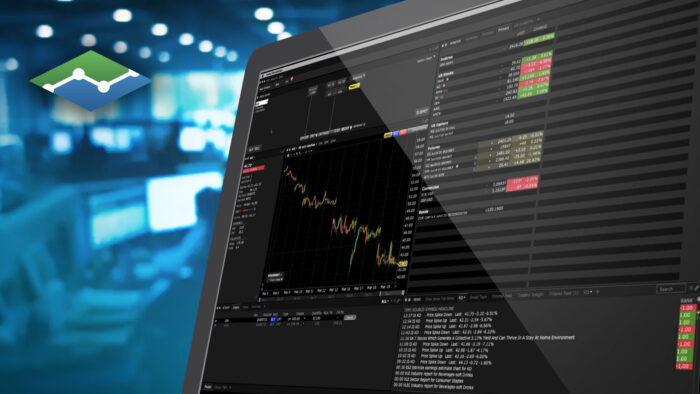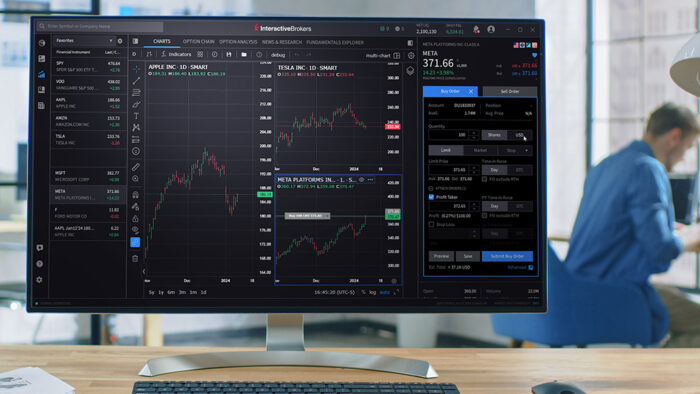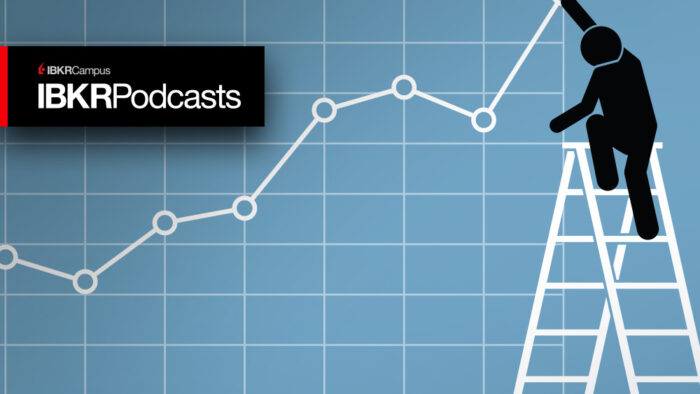Originally posted 23 January 2024 – Takeaways from the Taiwan Election
Taiwan produces over 60% of the world’s semiconductors and manufactures 90% of the most advanced chips. Taiwan’s centrality to the global economy requires us to be cognizant of the risks around its cross-strait relationship.
Taiwan held its national elections for the presidency and parliament this month. In line with market expectations, the Democratic Progressive Party (DPP) candidate Lai Ching-te won the presidency albeit with a non-DPP legislative majority in parliament. Given that this was largely priced in, market reaction has been muted. While we agree that the election itself has not triggered an event, the presence of a new Taiwanese leader in 2024 still means that some residual downside risk emanates over the course of the year.
In particular, the new Taiwanese administration has to ensure it delivers the right balancing act in its foreign relations during the upcoming months. As with any new government, this entails some execution risk, especially since Mr. Lai was Beijing’s least-favored candidate. Furthermore, Taiwanese politics notwithstanding, there are potential external drivers of heightened tensions in the Taiwan Strait. These could originate from the current US-China dynamic, especially with the looming US presidential election, which offers a canvas for foreign actors to influence by way of a foreign policy incident.
The focus here is less on extreme tail risks such as military conflict and more on the plausibility of scenarios of intermediary escalation (for instance, diplomatic saber rattling, naval or aerial incursions, temporary blockades, among others) that could generate a global market risk-off event. In particular, the transition period between Taiwanese administrations (from February 1 to May 20) is somewhat fragile as Beijing could choose to test the incoming government, after the new parliament has taken seat. The parliament is not only dominated by the opposition, but is also fragmented, which means that there is scope for more internal disagreements than before.
Alternative sources of risks are measures and rhetoric in the context of the US election. The key point is that market impact could be disproportionate as any Taiwan crisis could be viewed as a low likelihood/high impact combination – even if serious escalation were deemed to be very unlikely, the consequences could be dire. In the event of a war, a recent Bloomberg Economics report estimated the loss in global GDP to be at least double the contraction experienced during the Global Financial Crisis (GFC).
Taiwan’s centrality to the 21st century global economy – in the form of its dominance of the semiconductor industry – means financial markets need to monitor cross-strait relations carefully. Taiwan dominates the market for global foundries, outcompeting other Asia-based peers. This understates Taiwan’s qualitative edge in that the island is the sole producer of the most advanced semiconductors available today.
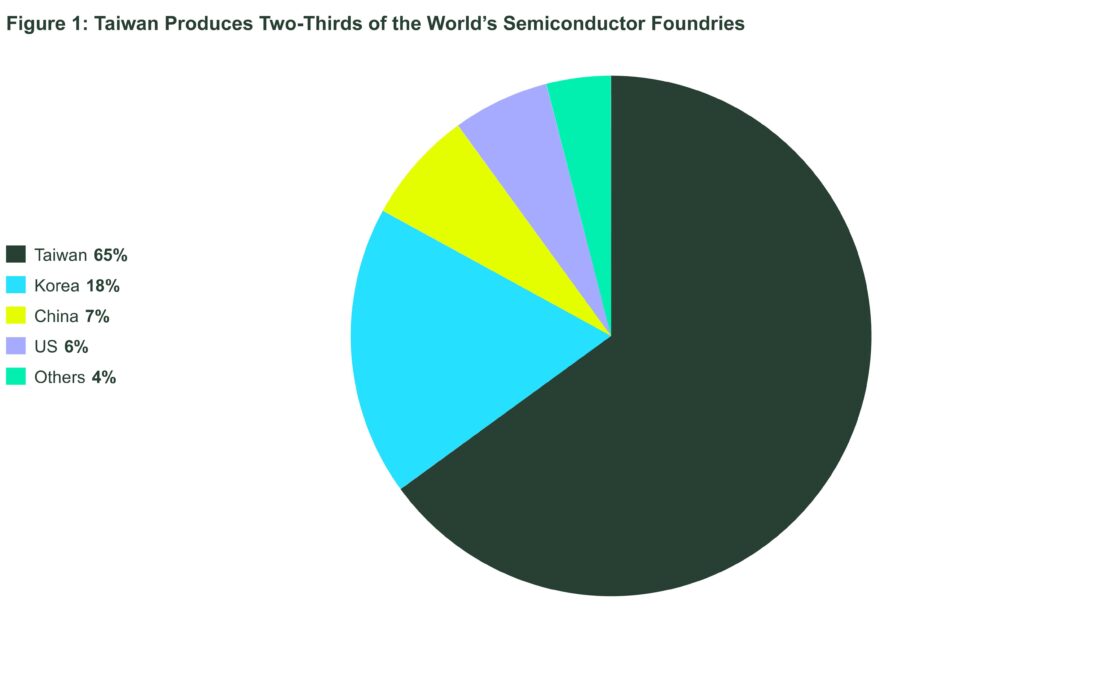
Source: Semiconductor Industry Association, as of December 31, 2022.
Past performance is not indicative of future results
Finally, while the manufacturing locations of the foundries are diversifying, this will happen at a very slow pace, which means global reliance on Taiwan is likely to persist well into the 2030s. Geopolitical risk is indeed growing – not only due to China’s fear of Taiwan’s social trends toward identifying as a separate state – but also as Western pressure is beginning to impact the relative direction of Taiwanese exports (Figure 2).
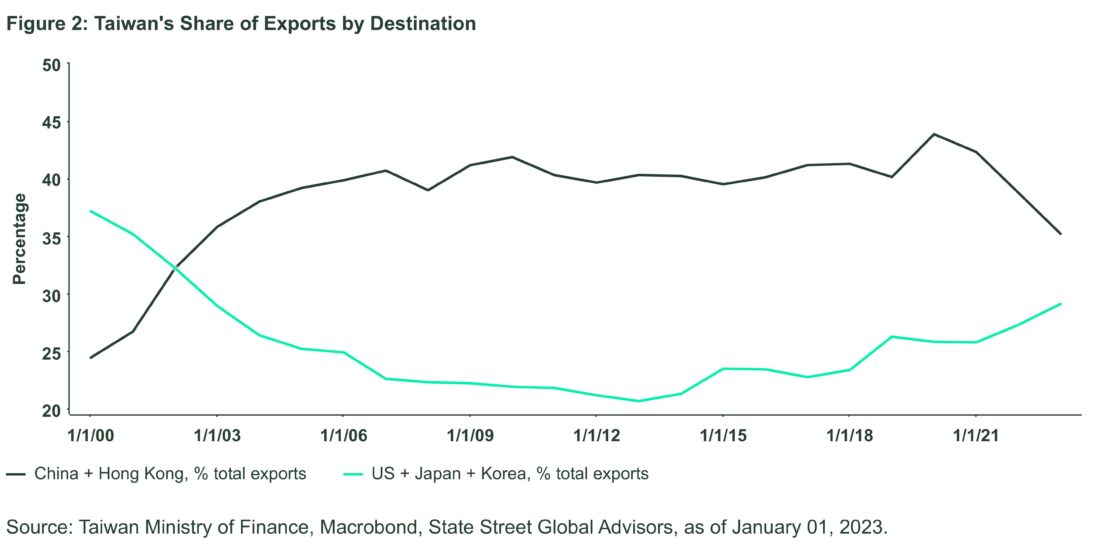
Source: Taiwan Ministry of Finance, Macrobond, State Street Global Advisors, as of January 01, 2023.
Past performance is not indicative of future results
Investment Implications
Given Taiwan’s exchange rate policies, the Taiwanese dollar is less adept at signalling future tensions compared with equity indicators. Increased episodes of risk-off events expected in relation to Taiwan’s foreign relations may result in a spike in cross-asset volatility over upcoming months. This is in addition to the negative tailwinds of armed conflict in Ukraine and the Middle East as well as risks related to the upcoming US presidential election.
Disclosure: State Street Global Advisors
Do not reproduce or reprint without the written permission of SSGA.
All information has been obtained from sources believed to be reliable, but its accuracy is not guaranteed. There is no representation or warranty as to the current accuracy, reliability or completeness of, nor liability for, decisions based on such information and it should not be relied on as such.
State Street Global Advisors and its affiliates (“SSGA”) have not taken into consideration the circumstances of any particular investor in producing this material and are not making an investment recommendation or acting in fiduciary capacity in connection with the provision of the information contained herein.
ETFs trade like stocks, are subject to investment risk, fluctuate in market value and may trade at prices above or below the ETF’s net asset value. Brokerage commissions and ETF expenses will reduce returns.
Bonds generally present less short-term risk and volatility than stocks, but contain interest rate risk (as interest rates raise, bond prices usually fall); issuer default risk; issuer credit risk; liquidity risk; and inflation risk. These effects are usually pronounced for longer-term securities. Any fixed income security sold or redeemed prior to maturity may be subject to a substantial gain or loss.
Investing involves risk including the risk of loss of principal.
The whole or any part of this work may not be reproduced, copied or transmitted or any of its contents disclosed to third parties without SSGA’s express written consent.
Investing in high yield fixed income securities, otherwise known as “junk bonds”, is considered speculative and involves greater risk of loss of principal and interest than investing in investment grade fixed income securities. These Lower-quality debt securities involve greater risk of default or price changes due to potential changes in the credit quality of the issuer.
COPYRIGHT AND OTHER RIGHTS
Other third party content is the intellectual property of the respective third party and all rights are reserved to them. All rights reserved. No organization or individual is permitted to reproduce, distribute or otherwise use the statistics and information in this report without the written agreement of the copyright owners.
Definition:
Arbitrage: the simultaneous buying and selling of securities, currency, or commodities in different markets or in derivative forms in order to take advantage of differing prices for the same asset.
Fund Objectives:
SPY: The investment seeks to provide investment results that, before expenses, correspond generally to the price and yield performance of the S&P 500® Index. The Trust seeks to achieve its investment objective by holding a portfolio of the common stocks that are included in the index (the “Portfolio”), with the weight of each stock in the Portfolio substantially corresponding to the weight of such stock in the index.
VOO: The investment seeks to track the performance of a benchmark index that measures the investment return of large-capitalization stocks. The fund employs an indexing investment approach designed to track the performance of the Standard & Poor’s 500 Index, a widely recognized benchmark of U.S. stock market performance that is dominated by the stocks of large U.S. companies. The advisor attempts to replicate the target index by investing all, or substantially all, of its assets in the stocks that make up the index, holding each stock in approximately the same proportion as its weighting in the index.
IVV: The investment seeks to track the investment results of the S&P 500 (the “underlying index”), which measures the performance of the large-capitalization sector of the U.S. equity market. The fund generally invests at least 90% of its assets in securities of the underlying index and in depositary receipts representing securities of the underlying index. It may invest the remainder of its assets in certain futures, options and swap contracts, cash and cash equivalents, as well as in securities not included in the underlying index, but which the advisor believes will help the fund track the underlying index.
The funds presented herein have different investment objectives, costs and expenses. Each fund is managed by a different investment firm, and the performance of each fund will necessarily depend on the ability of their respective managers to select portfolio investments. These differences, among others, may result in significant disparity in the funds’ portfolio assets and performance. For further information on the funds, please review their respective prospectuses.
Entity Disclosures:
The trademarks and service marks referenced herein are the property of their respective owners. Third party data providers make no warranties or representations of any kind relating to the accuracy, completeness or timeliness of the data and have no liability for damages of any kind relating to the use of such data.
SSGA Funds Management, Inc. serves as the investment advisor to the SPDR ETFs that are registered with the United States Securities and Exchange Commission under the Investment Company Act of 1940. SSGA Funds Management, Inc. is an affiliate of State Street Global Advisors Limited.
Intellectual Property Disclosures:
Standard & Poor’s®, S&P® and SPDR® are registered trademarks of Standard & Poor’s® Financial Services LLC (S&P); Dow Jones is a registered trademark of Dow Jones Trademark Holdings LLC (Dow Jones); and these trademarks have been licensed for use by S&P Dow Jones Indices LLC (SPDJI) and sublicensed for certain purposes by State Street Corporation. State Street Corporation’s financial products are not sponsored, endorsed, sold or promoted by SPDJI, Dow Jones, S&P, their respective affiliates and third party licensors and none of such parties make any representation regarding the advisability of investing in such product(s) nor do they have any liability in relation thereto, including for any errors, omissions, or interruptions of any index.
BLOOMBERG®, a trademark and service mark of Bloomberg Finance, L.P. and its affiliates, and BARCLAYS®, a trademark and service mark of Barclays Bank Plc., have each been licensed for use in connection with the listing and trading of the SPDR Bloomberg Barclays ETFs.
Distributor: State Street Global Advisors Funds Distributors, LLC, member FINRA, SIPC, an indirect wholly owned subsidiary of State Street Corporation. References to State Street may include State Street Corporation and its affiliates. Certain State Street affiliates provide services and receive fees from the SPDR ETFs.
ALPS Distributors, Inc., member FINRA, is distributor for SPDR® S&P 500®, SPDR® S&P MidCap 400® and SPDR® Dow Jones Industrial Average, all unit investment trusts. ALPS Distributors, Inc. is not affiliated with State Street Global Advisors Funds Distributors, LLC.
Before investing, consider the funds’ investment objectives, risks, charges, and expenses. For SPDR funds, you may obtain a prospectus or summary prospectus containing this and other information by calling 1‐866‐787‐2257 or visiting www.spdrs.com. Please read the prospectus carefully before investing.
Disclosure: Interactive Brokers
Information posted on IBKR Campus that is provided by third-parties does NOT constitute a recommendation that you should contract for the services of that third party. Third-party participants who contribute to IBKR Campus are independent of Interactive Brokers and Interactive Brokers does not make any representations or warranties concerning the services offered, their past or future performance, or the accuracy of the information provided by the third party. Past performance is no guarantee of future results.
This material is from State Street Global Advisors and is being posted with its permission. The views expressed in this material are solely those of the author and/or State Street Global Advisors and Interactive Brokers is not endorsing or recommending any investment or trading discussed in the material. This material is not and should not be construed as an offer to buy or sell any security. It should not be construed as research or investment advice or a recommendation to buy, sell or hold any security or commodity. This material does not and is not intended to take into account the particular financial conditions, investment objectives or requirements of individual customers. Before acting on this material, you should consider whether it is suitable for your particular circumstances and, as necessary, seek professional advice.
